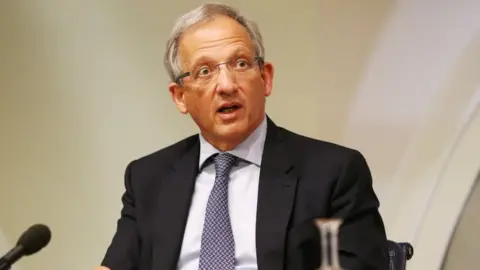Wrong time for interest rate rise, Cunliffe warns
 Getty Images
Getty ImagesBank of England deputy governor Sir Jon Cunliffe has joined the debate over raising UK interest rates, indicating now is not the right time for a rise.
Governor Mark Carney has also said this is not the time for a rate adjustment.
But chief economist Andy Haldane has said he may join rate rise dissenters and back a hike later in the year.
Sir Jon told the BBC he wanted to see how inflation pressures evolved before deciding to raise interest rates from a record low 0.25%.
He also wanted to watch and see if improvements in business investment and exports could compensate for a consumer slowdown.
At its last rate rise meetings, three out of eight members of the Bank's Monetary Policy Committee (MPC) surprisingly voted to raise interest rates, jolting financial markets.
The 5-3 vote by the Bank's policymakers was the closest for a rate rise since 2007, and came with inflation close to a four-year high of 2.9%.
Inflation is now well above the Bank's target rate of 2%.
'A bit of time'
He told BBC Radio 5 live's Wake Up To Money that consumer spending "is slowing as households' real incomes are squeezed by higher inflation, we expect some of that slowing to be offset by growth in business investment, growth in exports. And I want to see how that plays out."
Sir Jon added: "We do have to look at what's happening to domestic inflation pressure, and I think that, on the data we have at the moment, gives us a bit of time to see how this evolves."
The Bank said earlier this month inflation was likely to exceed 3% this autumn.
Inflation overshooting the BoE's target was "not a comfortable place" for any member of the MPC, Sir Jon said.
However, he added that it was important to consider how much of the overshoot was generated domestically, and how much was a product of the fall in the strength of the pound, which makes imports more expensive.
The Bank deputy governor also pointed out that average earnings excluding bonuses rose at an annual rate of just 1.7% in the three months to April, the weakest increase since January 2015.
